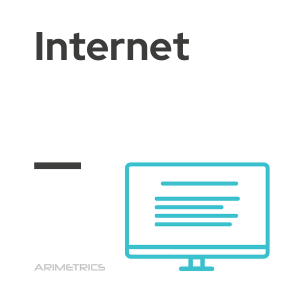
Definition:
The Internet is a decentralized set of networks interconnected through a set of protocols called TCP/IP. It is defined as “the worldwide computer network, decentralized and formed by the direct connection between computers through a special communication protocol”.
Its name comes from the English Interconnected Networks. It is characterized because it allows free exchange and access to information without barriers of time and space. There is talk that it has led to a certain ‘democratization’, since it gives access to a large amount of data at a relatively low cost or even free if the resources available in many public bodies are used. In any case, in Western countries it is strange the home that does not have a broadband connection and at least one computer with internet access, not to mention the evolution of mobile phones since the emergence of smartphones.
The origin of the Internet
The possibility of connecting some networks with others so that a global network could be built arose as a result of an experiment by the United States Department of Defense in 1969,in the middle of the nuclear race. Although the most widespread version is that a communications system was sought in case of a possible attack, the truth is that the Network had a rather academic origin and among the objectives of its creators was to be able to exchange information with institutions throughout the country without having to invest in a huge number of expensive computers. Thus, the Initial Network(ARPAnet,Advanced Research Projects Agency Network) was born, which connected universities and high-tech centers with companies to exchange scientific and military data.
Although sometimes confused, the Internet and the World Wide Web (WWW) are not synonymous. The second is a system developed in 1989 by Tim Berners Lee and Robert Cailliau to access connected information through the http protocol (HyperTex Transfer Protocol), which uses the Internet as a means of transmission and has extended its use in an unimaginable way.
Bill Gates,co-founder of Microsoft and one of those responsible for the technological revolution of recent decades, has already predicted that “what is not on the Internet does not exist”. Nowadays, all public institutions, brands and even SMEs are obliged to have a website or, at least, presence on social networks with basic information about their activity and access to different actions.
The technological revolution

- The decline of most physical formats (books, newspapers, CDs, etc.) and a different way of consuming culture and leisure.
- The modification of personal relationships,without spatial or physical barriers thanks to email, social networks or instant messaging.
- An evolution of business. Videoconferencing, the immediate exchange of all types of files or teleworking speed up the activity of a company. In the same way, there is a parallel increase in the demand for jobs related to the so-called digital transformation.
- The introduction of technology in all areas. The so-called ‘internet of things’ is already everywhere: cars, household appliances, etc.
- The immediacy provided by the widespread use of smartphones.Users access information anywhere and anywhere, which has also forced to modify the rules of advertising (personalized and user-centered).
- Democratization of information thanks to widespread access to the internet (broadband, increasingly affordable price).
The disadvantages of the Internet
The unbridled speed with which it has infiltrated all aspects of society in a short period of time and its constant evolution have meant that the Internet has many regulatory gaps and insufficient self-control. Therefore, periodically there are incidents that highlight the disadvantages that the universal connection can have and that we could summarize in the following:
- The leakage of personal data. Privacy (or rather the lack of it) is one of the aspects that most concerns users and almost the only reason that has forced governments to intervene in the regulation of a cooperative and open network. The latest Facebook scandals, such as the data leak to Cambridge Analytica that interfered in Donald Trump’s victory, have exposed internet security breaches.
- Digital illiteracy or ignorance of new technologies. It particularly affects the older population and people with little training. It implies a form of marginalization that affects access to the world of work and education.
- The appearance of new addictions. Cyberaddiction is a pathology that involves the abusive use of the Internet and that often requires psychological treatment. The obsession with being connected, which is not recognized in the field, appears more frequently in the so-called ‘digital natives’.
